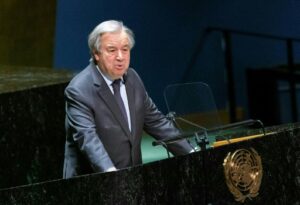David Beasley, Executive Director for the UN World Food Programme, is one of the most popular and welcomed visitors today in major offices around the world. Ukraine and Russia are among the most important producers of agricultural commodities. And now both countries, especially Ukraine, are limiting their exports due to Russia’s brutal invasion of Ukraine. After all, Ukraine needs to secure its own reserves. There are predictions that hundreds of millions of people around the world will feel the effects of the coming food shortage.
UN Secretary-General António Guterres said the hunger will hit the poorest and the most vulnerable. Some 45 African and less developed countries import at least a third of their wheat from Ukraine or Russia, with 18 of those importing at least 50 percent, Guterres said in a recent address.

In this photo of Feb. 28, 2022, UN Secretary-General Antonio Guterres speaks about Russia’s war on Ukraine at the General Assembly emergency session. Guterres warned on March 14, 2022, that the world must act to prevent a “hurricane of hunger and a meltdown of the global food system” as a result of Russia’s invasion of Ukraine, a huge agricultural producer. (Photo by Kena Betancur / AFP)
“We must do everything possible to avert a hurricane of hunger and a meltdown of the global food system. In addition, we are seeing clear evidence of this war draining resources and attention from other trouble-spots in desperate need…. This war goes far beyond Ukraine. It is also an assault on the world’s most vulnerable people and countries,” Guterres underscored. His statement shows this war is going to kill many beyond the military actions.
Ukrainian Agrarian Minister Roman Leshchenko said, describing the situation, that at the beginning of this year’s sowing season “Ukrainian farmers use machine guns instead of ploughshares. They even take away Russian tanks using their tractors.”
More than 400 million people around the globe depend on grain supplies from Ukraine alone, the Kyiv School of Economics reports. Countries of the Middle East and North Africa are those to suffer the most, but the hunger will probably increase in countries of Asia and Latin America too.
“A major global humanitarian crisis is emerging. Hundreds of millions of people are threatened by food insecurity and a major humanitarian crisis emerging not only in Ukraine but in a large number of low-income grain-importing countries”, says Oleh Nivievskyi, KSE Vice President of Economic Education.
Russia is bombing and shelling the southern regions with some of the most fertile black soils in the world. Communities that have farmed these rich lands for centuries are now suffering the effects of hunger. Much of Kherson Region is occupied, the shelves of the shops are empty, people wake up early and stand in queues for hours to get some butter. Mariupol is a humanitarian disaster zone, and people are struggling to save their lives there, not thinking about any kind of food.
Ukraine will be able to provide food for its citizens when the war finishes. But the decline in exports will hit many countries. First, it was difficult to start the sowing season as Russia attacked so much territory around Ukraine. Central Ukraine is traditionally the safest area for harvests. But there are more and more problems now as a consequence of the invasion.
“We are urgently solving other big problems: importing high-quality foreign seeds in conditions of disintegration of government agencies, getting fuel for our tractors, which our tanks need so much, organizing logistics of import and export, when the occupier intentionally destroys precisely civil and economic facilities,” Leshchenko says.
Another issue is paralyzed Ukrainian ports that the Russian army continues to blockade in violation of maritime law. Ukraine exports around 60% of agricultural products via ports so this is a big challenge for the sowing campaign. While trying to renew overland chains of supply, Ukraine is defending itself, including from shelling and attacks by Russia from the sea. While it is hard for Ukrainians to think of tasty food, juicy stories come along with the war. When a Russian warship offered Ukrainians the chance to surrender during an attack on Zmiinyy Island, Ukrainian border guards told the Russians to chill out:
“Russian warship, f*** off!” This phrase is posted almost on every door of every venue in Ukraine, and it is on billboard too. It is run on television and radio, despite kids being able to hear it. This story has become a symbol of the resilience of the Ukrainian nation in defense of their home, independence, freedom and democracy. And it went far beyond national borders.
Polish President Andrzej Duda met World Food Programme David Beasley Chief and learned that he would speak with Russian Foreign Minister Sergey Lavrov. Duda had a small favor to ask, in particular to convey to Lavrov two words he said in Russian: “Russian warship…”
He did not finish the phrase, but the ending was quite clear.
